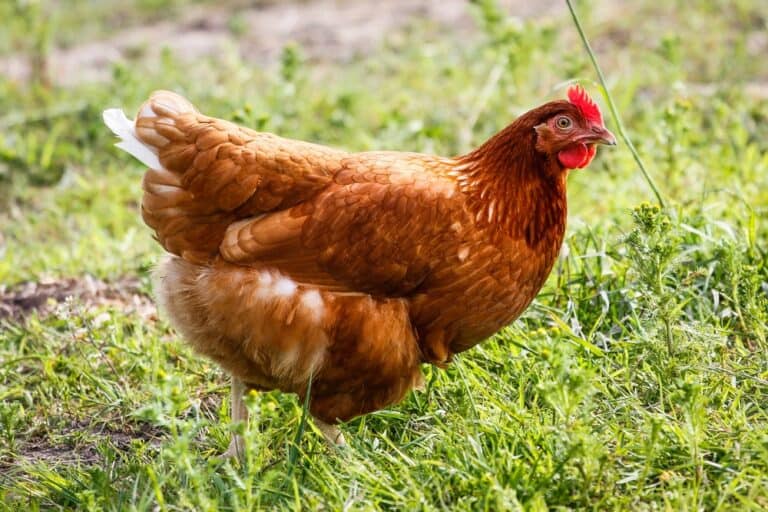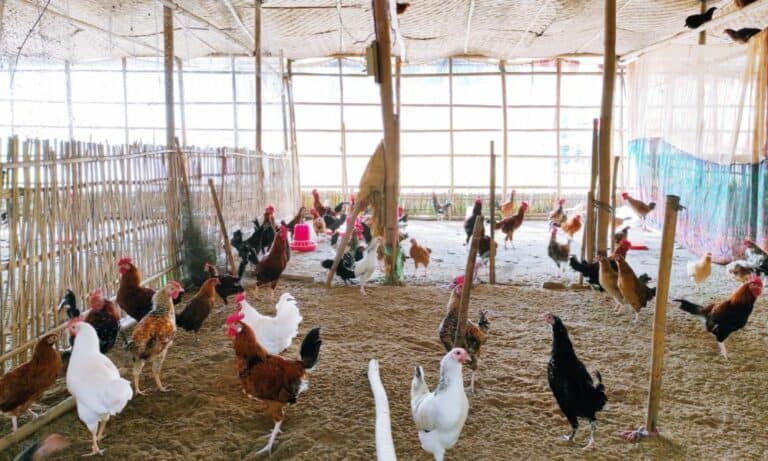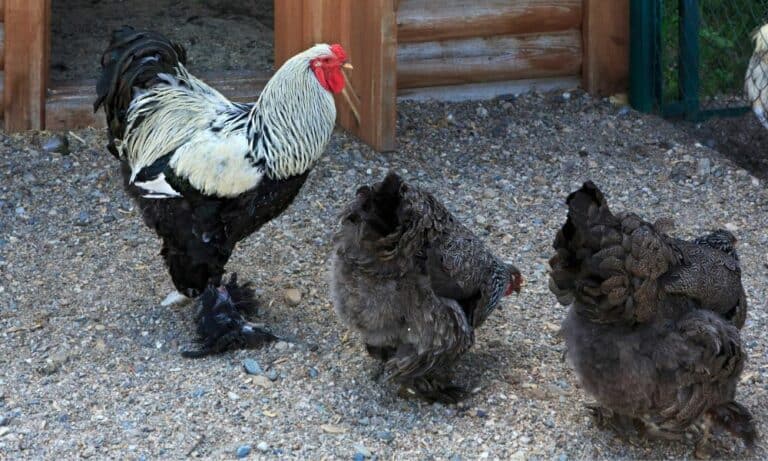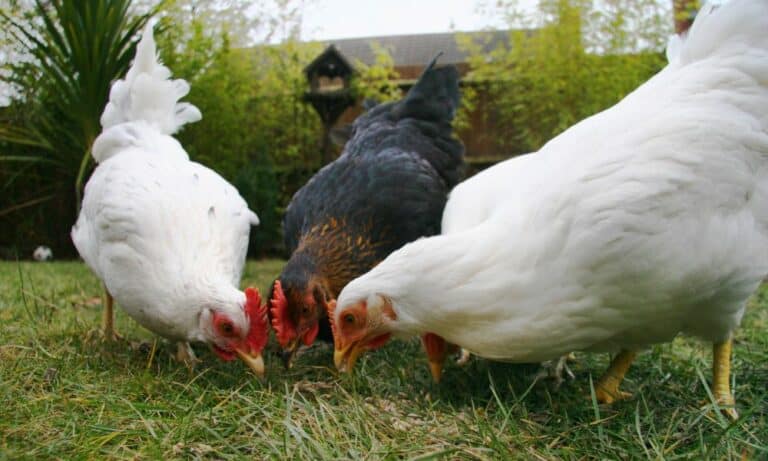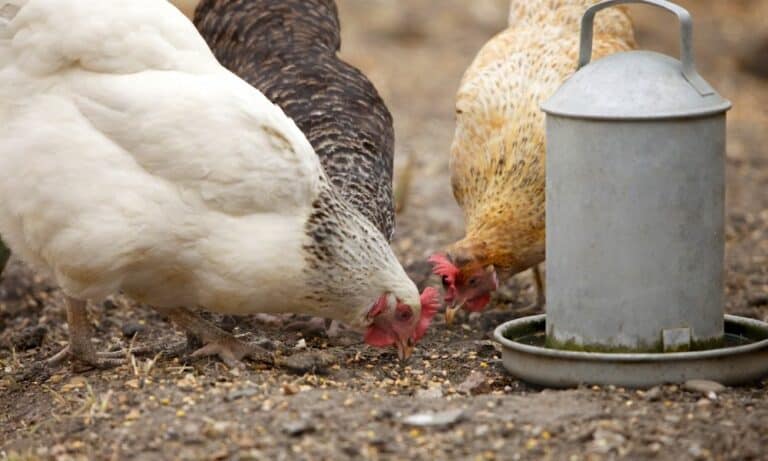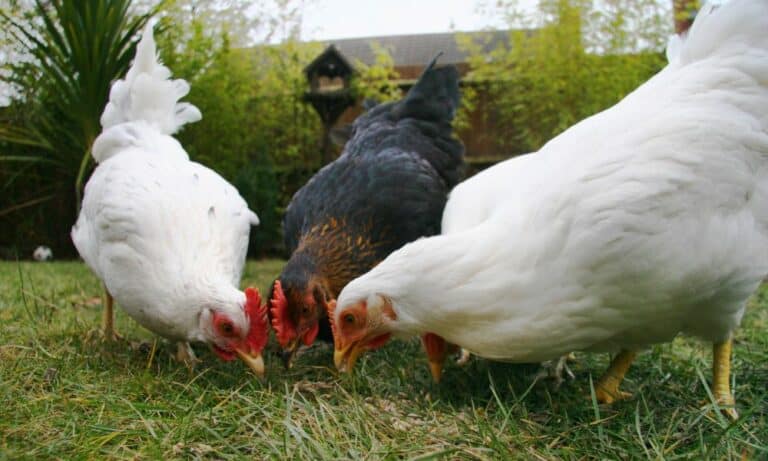Most chicken keepers want their birds to be as happy and healthy as possible, which is why most people enjoy giving their flock a range of tasty treats to supplement their regular food – a varied diet for chickens helps alleviate boredom while adding beneficial nutrients to their food.
However, as any conscientious chicken keeper also knows, while many foods are perfect for chickens to eat, some are best avoided, so you may be wondering about the question, can chickens eat plums? And to help, here, we have all the answers you need!
Can Chickens Eat Plums? The short answer

In a moment, we’ll look at feeding plums to chickens in more depth, but let’s start with a short answer to a simple question.
Can chickens eat plums? Yes, they can.
Most chickens love plums and similar fruits, and what’s more, plums contain a range of nutrients and other health-giving properties that make them highly beneficial to chickens.
All of this makes plums an excellent choice of treat for chickens, so if you have some spare plums and want to share them with your birds, go ahead because your chickens are sure to enjoy this tasty treat.
What are plums?
Having given the short answer, now we can jump in and look at the question in a bit more detail – and to start, let’s talk a bit about what plums are and where they come from.
Plums are thought to be one of the very first fruits to be domesticated many thousands of years ago, and nowadays, they come in an almost bewildering array of varieties.
They belong to the genus Prunus, which means plums are also related to fruits such as peaches, nectarines, apricots and cherries – as well as almonds.
The most widely cultivated plum is the so-called Japanese (or Chinese) plum, but other common types include European plums (which include damsons), greengages, Mirabelle plums and others.
Plums are known technically as drupes – or stone fruits. This means each fruit contains a single large seed – the “pit” or “stone”. The flesh around the seed can be eaten, but the pit itself should be discarded and not consumed – by humans or by chickens!
Are plums good for chickens?
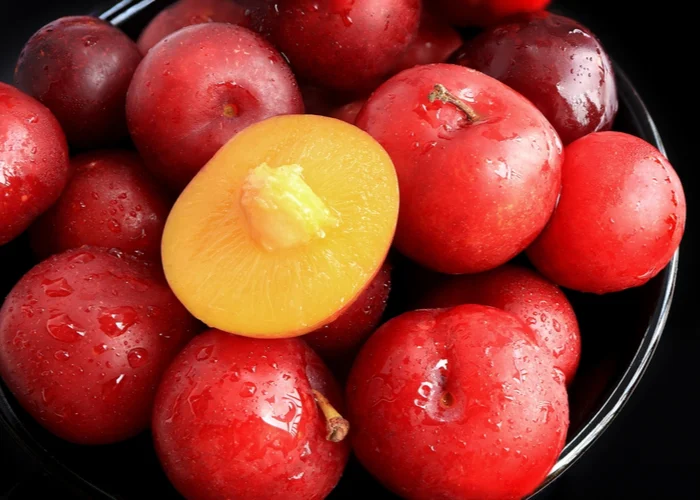
So now we know what plums are and that chickens can eat them – but are they good for chickens?
In a word, yes.
Plums contain important nutrients, and they are also rich in antioxidants.
Plums are around 87% water, and their main nutritional value is as a carbohydrate, which makes up around 11% of a plum. They also provide some dietary fiber while being low in fat.
They contain moderate levels of vitamin C, but other vitamins are not present in significant amounts. They also contain small amounts of some minerals such as potassium and calcium, although the quantities are not considered significant.
As well as these nutritional benefits, plums are known to contain a range of important antioxidants that can help keep chickens healthy.
However, plums are also relatively high in sugars (fructose, sucrose and glucose), which can be detrimental to chickens’ health when eaten in large quantities.
Which kinds can chickens eat?
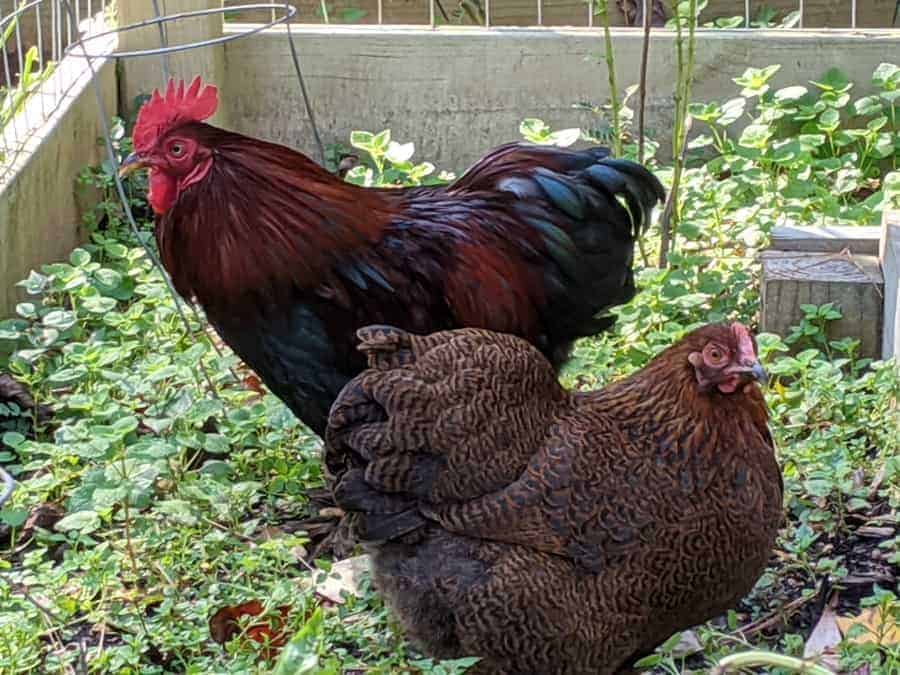
As we’ve already mentioned, plums come in all kinds of shapes and sizes, so which ones can chickens eat?
In fact, no particular types are better for chickens to eat than others, so they can eat whichever types you buy for yourself or whichever varieties you have growing in your garden.
There are no types of plum that chickens can’t eat, so you don’t need to worry about avoiding any particular varieties.
What about similar fruit in the same family?
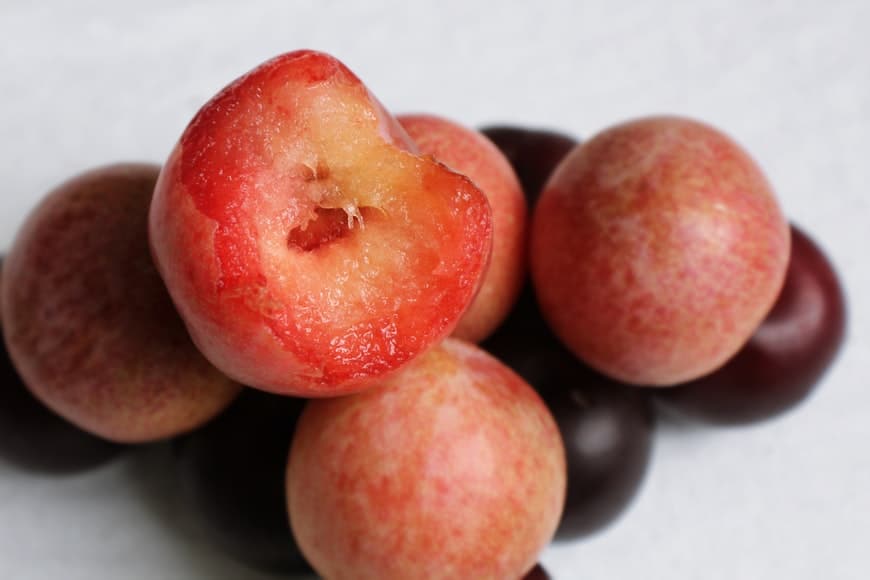
As well as plums, chickens can also eat other fruit from the Prunus genus, which includes apricots, peaches, nectarines and cherries.
They can also eat almonds, which are the edible stones from one particular member of this genus.
Can chickens eat prunes?
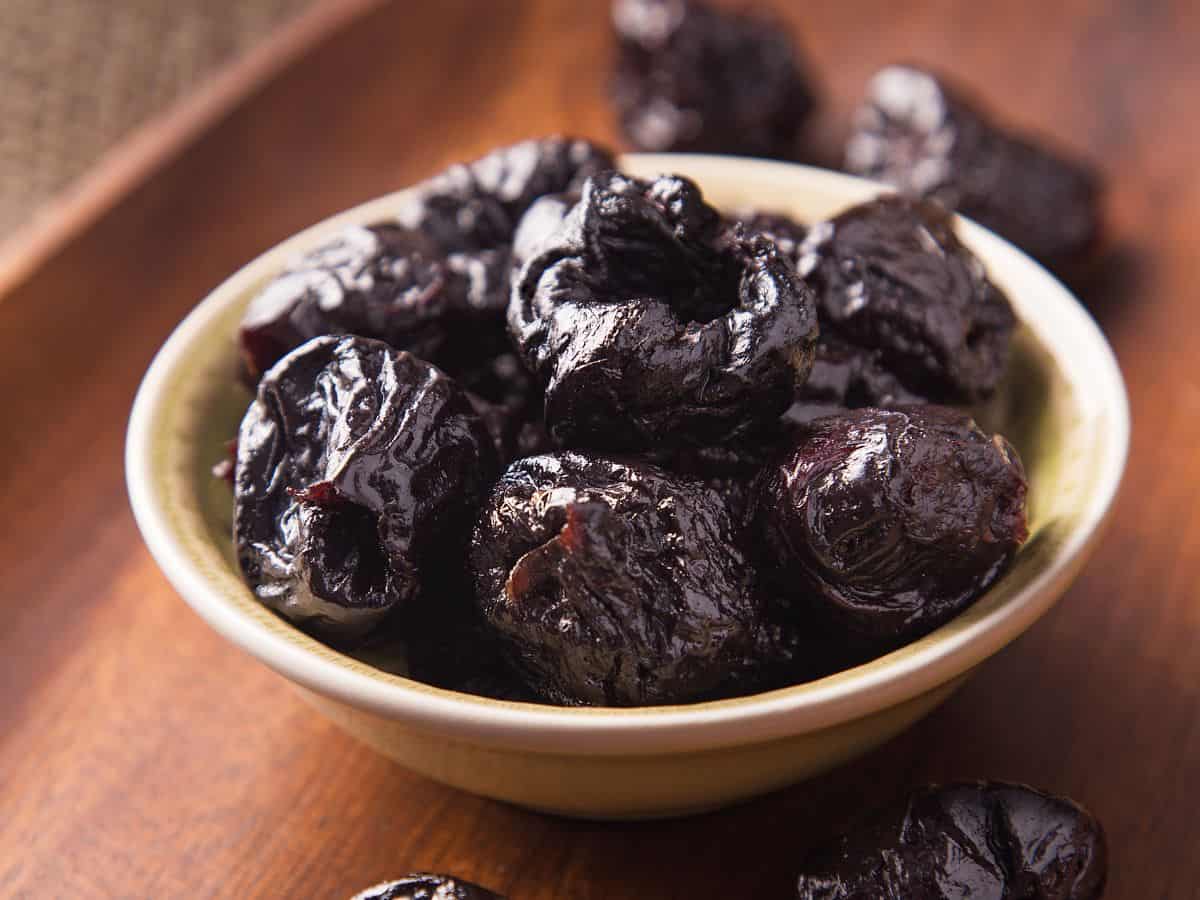
Prunes are dried plums, and they can also be fed to chickens. However, be aware that prunes have an even higher sugar content than plums, so make sure you don’t give your chickens too many.
Prunes are also well-known for their laxative effects, so this is another reason you don’t want to give your chickens too many.
Is there anything you need to be careful about?
The main thing to be careful about when feeding plums to chickens is the pit inside because it can pose a slight risk to your birds.
First, if a chicken tries to swallow a plum pit, there is a small chance the bird may choke.
Second, and perhaps more worryingly, plum pits – like many other fruit seeds – contain a compound called amygdalin, which breaks down into cyanide when ingested.
Obviously, you don’t want your chickens to be eating cyanide, so this is a risk you’ll be at pains to minimize.
However, in practice, it is unlikely that chickens will swallow a plum pit because they aren’t stupid – they know that plum pits aren’t food, so they will naturally avoid trying to eat them.
Furthermore, a plum pit will usually be too big for a chicken to swallow, which minimizes the risk even further.
And in any case, in terms of cyanide, the amount contained in a single pit is minimal, so they’d have to eat a lot for it to cause them any harm.
As a result, it’s probably quite safe to feed plums to chickens, pits and all.
However, if you don’t want to run even this minor risk, it’s no big job to halve plums and remove the pits before feeding them to chickens, so many chicken keepers prefer to do this, if just to err on the side of caution.
Give them organic plums if possible
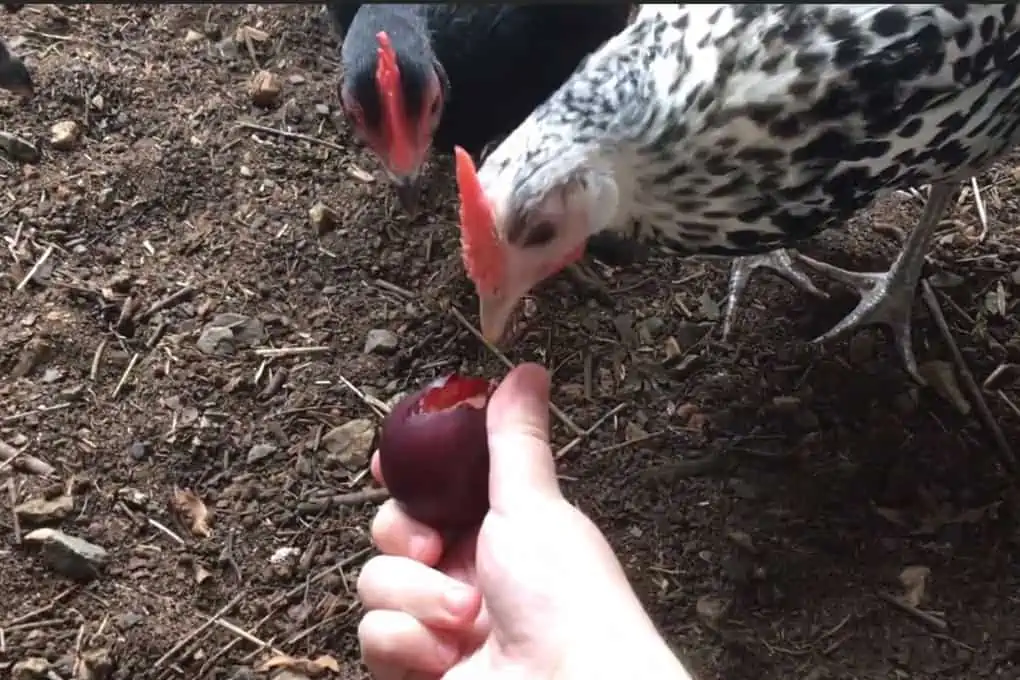
Another point to note is that if you buy your plums from a grocery store, you should always choose organic ones if you plan to feed them to your poultry.
This is because non-organic ones will likely have been sprayed with chemical pesticides that may harm your chickens, and buying organic ones will help you avoid this – even if they cost more.
If you can’t buy organic plums, you can still feed them non-organic ones – you just need to make sure you wash them thoroughly beforehand.
However, the best option is simply to have a plum tree in your garden, in which case you can feed any spare ones to your chickens as they ripen.
How to feed plums to chickens
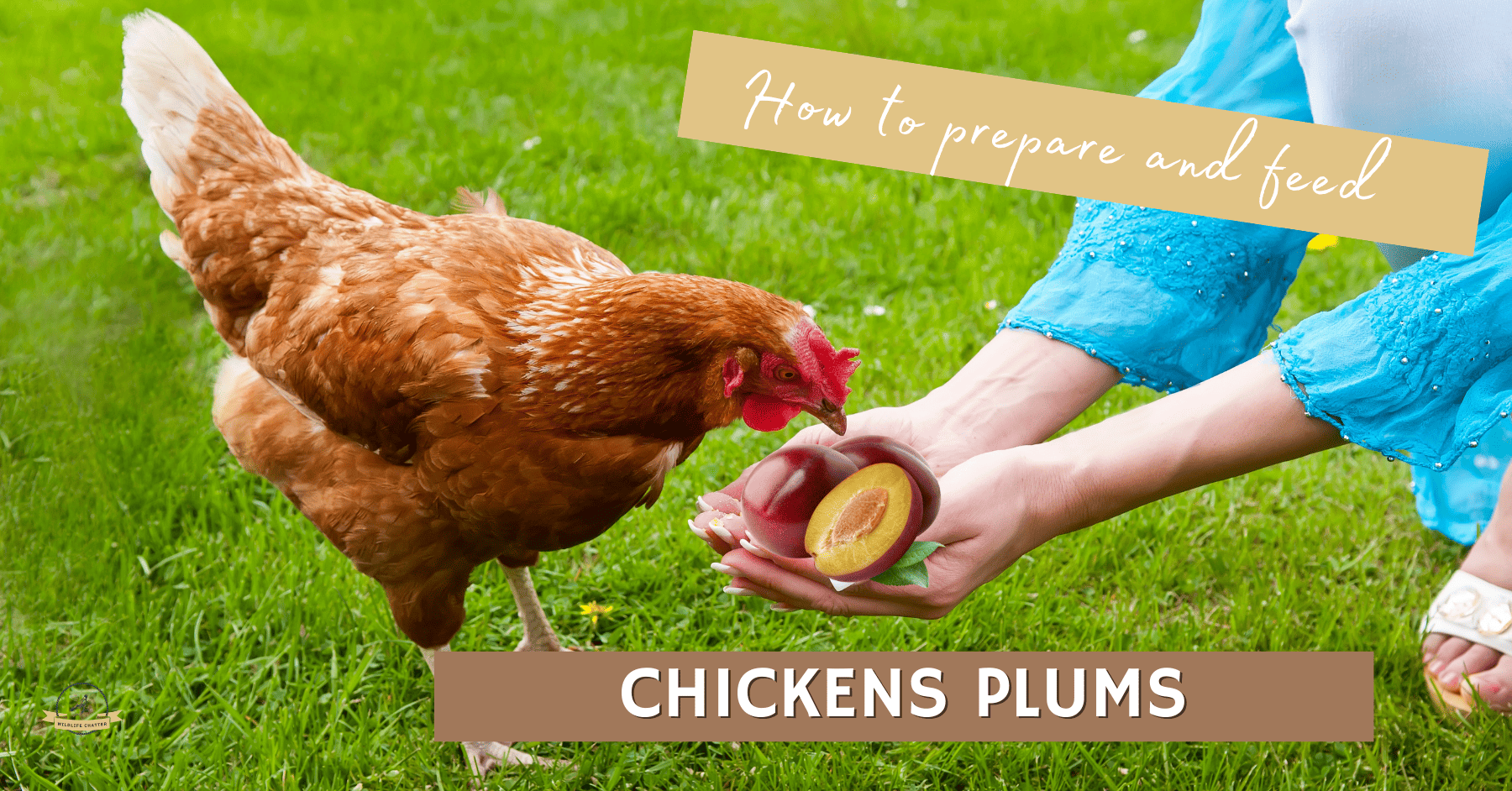
As we’ve seen, chickens can safely eat any type of plum, and there’s no particular way you need to prepare them – although many people will prefer to remove the pits, just to be safe.
You don’t need to remove the skins, and in fact, the skins contain plenty of goodness, so the chickens are fine to eat those too.
Just remember that after feeding time is over, you should collect up any leftovers because waste food left on the floor can attract rodents and other pests.
You can also feed plums to chicks after about three weeks. For chicks, it’s best to cut the plums up to make it easier for the chicks to eat them – and as with any new food, you should introduce plums to your chicks’ diet gradually.
Moderation

When giving chickens plums or any other type of treat, the most important thing to remember is moderation.
Chickens have very specific nutritional requirements, and these are met by commercial chicken feed that is specially formulated for the purpose.
However, if chickens are given too many treats, they may stop eating their regular feed, which can lead to reduced egg production and even malnourishment in some cases.
If you always remember that treats should only make up around 10% of a chicken’s diet, with the rest of what they eat coming from their regular feed, you should have no problems.
Chickens love tasty snacks like plums, and they can add beneficial extra nutrients to their diets – but don’t overdo it because there is such a thing as too much of a good thing.
Pro tip – freeze them for a tasty summer treat
In the summer when the weather is at its hottest, frozen plums can be given to chickens as a cooling treat.
Simply freeze the plums before serving them and then simply let your chickens peck at them as they thaw.
Your birds will love pecking at the cold fruit, and it will also help reduce their body temperature while they do it.
You can think of this as the equivalent of giving your chickens an ice cream as a treat when they need a bit of help cooling off!
A healthy, tasty snack to be fed in moderation
So as we’ve seen, plums can make a healthy and delicious treat for your chickens that they will love to eat and that will also supplement their regular feed by providing plenty of extra nutritional benefits.
As with any treats, you should only feed plums to your chickens in moderation – and treats should never make up more than 10% of their overall diet. But if you always remember this rule, feeding them plums or other similar snacks is a great way to keep your chickens happy.



